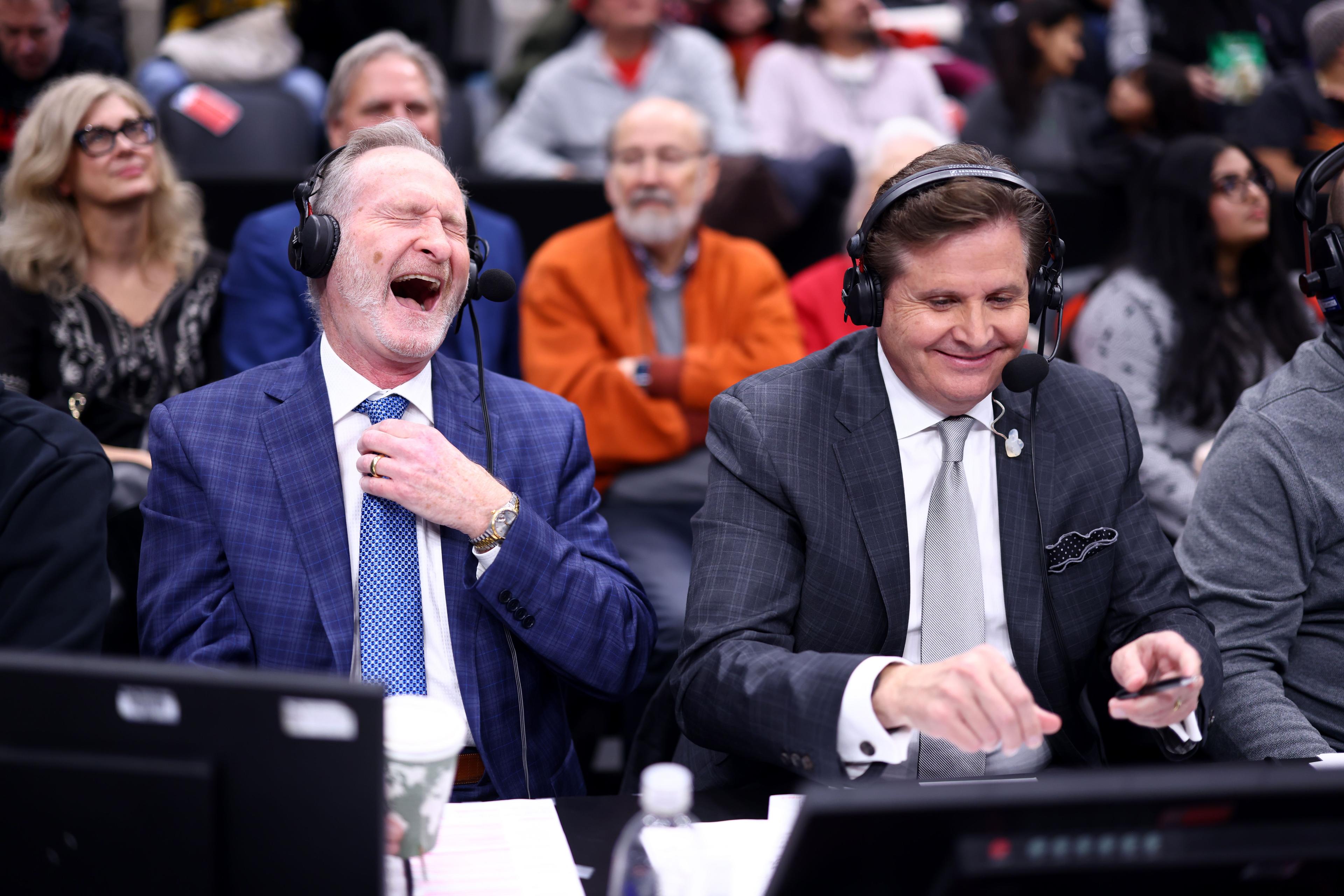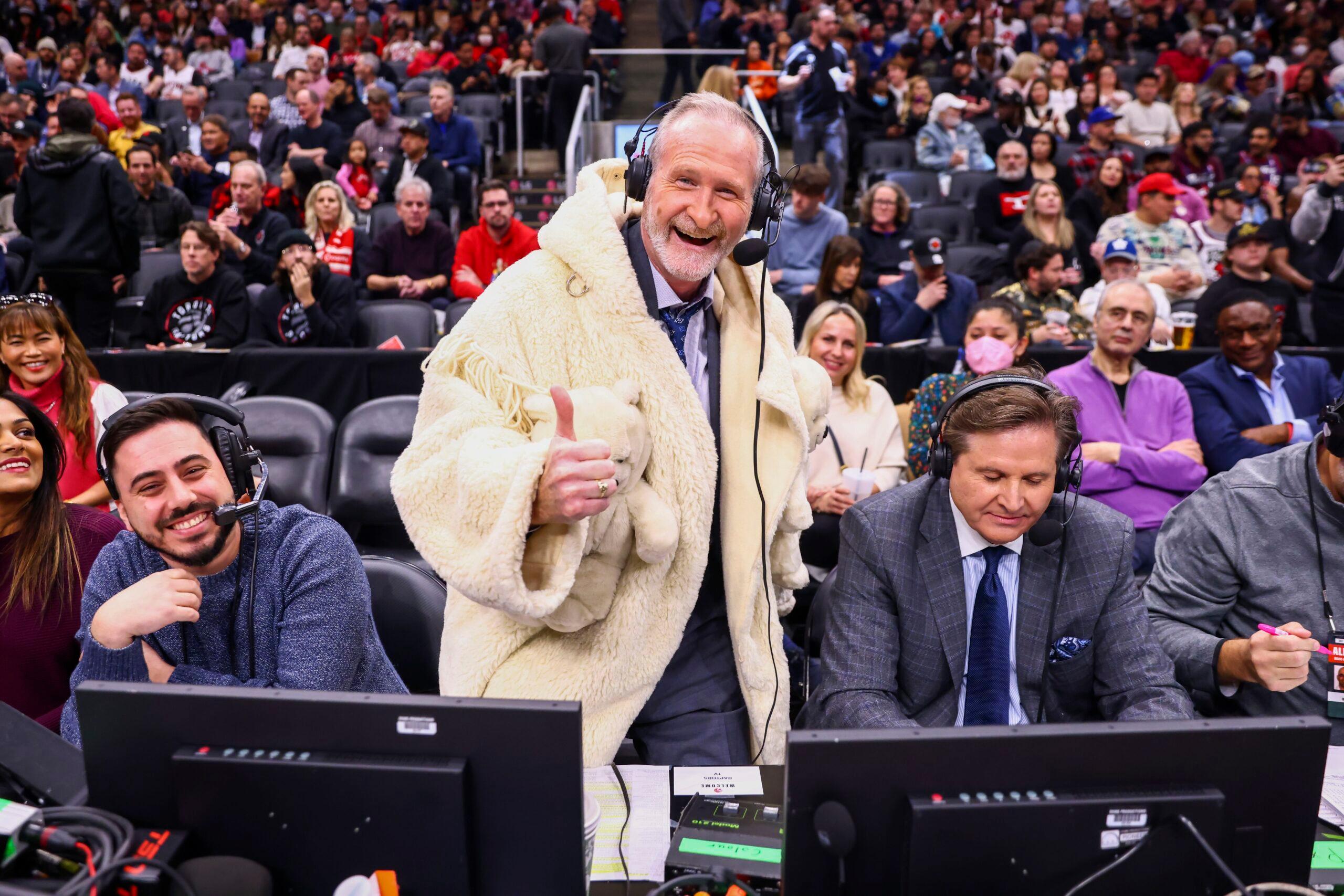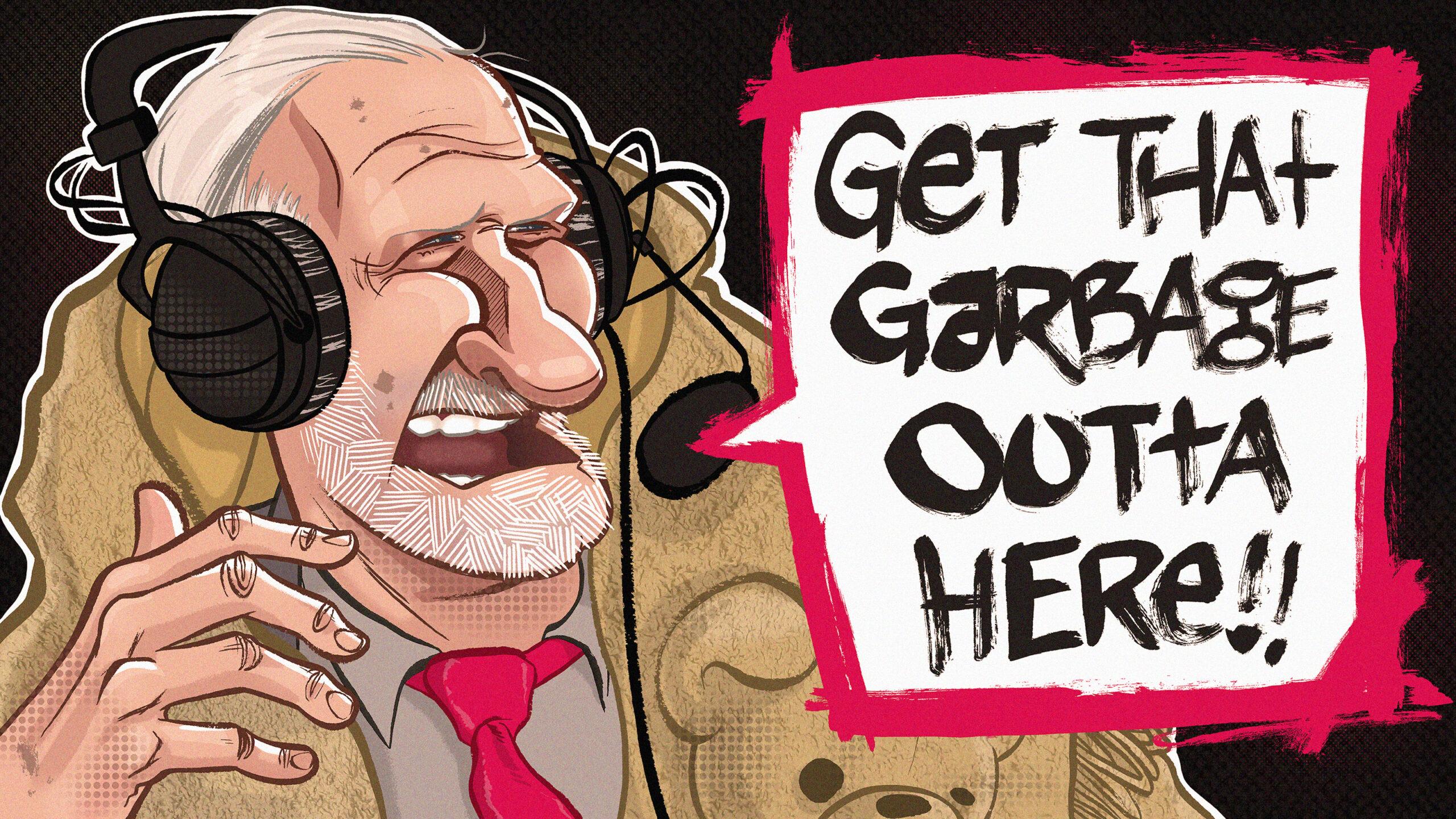Hellooo, Jack!
Twenty-five years ago, Jack Armstrong was an out-of-work college coach. Now, he’s the life of the party on the Raptors’ sidelines. Meet Canada’s least likely basketball icon.Talk to anyone who’s spent time with Jack Armstrong, the longtime radio and TV color analyst for the Toronto Raptors, and they’ll have a story about him commandeering the stage at a piano bar. Four years ago, Armstrong walked into a piano lounge on Fifth Avenue in New York with current broadcast partner Matt Devlin and Alex McKechnie, the Raptors’ vice president of player care and performance. It was the holiday season; Christmas carols were being sung. As the three stood on the sideline, Devlin nudged Armstrong.
“You’re better than that guy,” Devlin whispered.
“I am,” Armstrong replied.
Devlin saw the look in Armstrong’s eyes.
“You want to sing.”
Devlin proceeded to do what any enabling friend in that situation would. He walked up to the piano bar and addressed the crowd. “Excuse me, everyone,” he said. “Do you mind if I introduce somebody who’s here off of a recent tour? Ladies and gentlemen, it is my honor, my privilege, to introduce to you John Joseph Armstrong.”
Fast-forward four years to an early December night at the Danforth Music Hall, a 104-year-old venue on the east side of Toronto, where hundreds of fans gathered for Jack Armstrong’s holiday sing-along, a live concert promoting Armstrong’s very real Christmas album, with the proceeds of both going to charity. In a way, it was a night like any other. Not much had changed, not even the way Devlin welcomed Armstrong onstage. “The difference between tonight and then,” Devlin joked, “is that nobody is going to be on their phone Googling John Joseph Armstrong.”
He was right. Jack, after all, was the reason we were all there. We wanted to hear him sing, unrestrained, all the Christmas songs he’d hummed and warbled on broadcasts over the years, to bask in the absurdity of the moment, of seeing his face plastered on ugly Christmas sweaters, on vinyl sleeves.
Armstrong, who turned 60 in January, would be the first to tell you he’s a scam artist: a burned-out mid-major Division I basketball coach who failed upward, landing the radio color analyst role with the Raptors in the same season that rookie Vince Carter changed the landscape of Canadian basketball forever. In the ensuing 25 years, he parlayed it all into a kind of transnational celebrity: Armstrong is the only NBA broadcaster to record two holiday albums and is perhaps the only person other than Drake to know what it’s like to boil inside a teddy bear mink coat because he wore it for an hour during a home game against the Brooklyn Nets back in late November. On Sunday, he will be marching downtown as the grand marshal of Toronto’s St. Patrick’s Day parade.
Seated on the mezzanine level back in December, I watched as the spotlight descended upon Armstrong, now in his 25th season of covering the Raptors. He was in his element, absorbing the ovation from Raptors fans (and more than a few drinking buddies from Buffalo) who gathered to celebrate the charmed life of Jack Armstrong, Canada’s least likely basketball icon.

Get that gaah-bage outta here!
Armstrong has long forgotten the moment responsible for the visceral call that has become one of the most iconic catchphrases in modern NBA broadcasting. But his former announcing partner Chuck Swirsky, the current Chicago Bulls radio play-by-play announcer who called Raptors games with Armstrong for 10 years, remembers it clearly.
“I’ll tell you where it started,” Swirsky said. “He started when we picked up Keon Clark.”
Clark, a spindly 6-foot-11 center acquired in a 2001 midseason trade with Denver, was a shot-blocking phenom; in his 33rd game as a Raptor, Clark blocked 12 shots in 28 minutes off the bench. “I mean, Keon was blocking these shots into the second row, courtside,” Swirsky continued. “He was spiking the ball into the stands.”
The blocks had become so commonplace, the thought of challenging Clark at the rim so futile, that one night, Armstrong relinquished the contempt within him as only a born-and-bred New Yorker could.
Get that gaah-bage outta here!
“And I thought, OK,” Swirsky said. “That will play.”
In the ensuing decades, the call has become inescapable—naturally, it was co-opted by the city of Toronto for a recycling PSA. In Jakob Poeltl’s return to Toronto following the Raptors’ deadline trade, the local broadcast aired a 2018 clip from the team’s behind-the-scenes documentary Open Gym, wherein a young Poeltl and Pascal Siakam do their best get that gaah-bage outta here, as if it were a rite of passage. Armstrong’s delivery has changed some over the decades—what once was a full-throated excoriation has become a shrill, mewling shriek of self-parody, a way of changing his intonation that legendary college basketball announcer Bill Raftery had once suggested he try. But its rooted point of origin remains the same.
“People ask me, how did you come up with get that garbage outta here? I’m like, that’s easy,” Armstrong said. “You play in a schoolyard in Brooklyn, you get your shot blocked, people tell you to get that fucking shit out of here, you know? Now, it’s a family show, I can’t use that, so I came up with ‘garbage.’ So, to me, it all comes together—there’s something about New York City, its soul. People are pretty rough and people are pretty honest and pretty direct. It’s just that soul of New York City basketball.”
Armstrong grew up in the Flatbush neighborhood of Brooklyn, the youngest of four sons. His father and mother are Irish immigrants who found each other at a dance in the Bronx. His mom worked as a lunch lady at P.S. 238, where a young Stephon Marbury would go to grade school. Armstrong fell in love with basketball when he turned 7, the same year his 48-year-old father died of a heart attack. He’d dribble his red-white-and-blue ABA ball with his right hand on the walk to the schoolyard and dribble home with his left. He played one-on-one against other kids at the one streetside hoop in the neighborhood—they’d each call dibs on an ABA team to represent: You were the Virginia Squires, you were the San Diego Conquistadors, the Kentucky Colonels, the New York Nets. He played with and against Hall of Famer Chris Mullin, a childhood friend. There was never a question as to who was better. “You learn early in life that he’s really good and you’re not,” Armstrong said.
People ask me, how did you come up with get that garbage outta here? I’m like, that’s easy. You play in a schoolyard in Brooklyn, you get your shot blocked, people tell you to get that fucking shit out of here, you know?Jack Armstrong
But he never quite gave up on his hoop dreams. Armstrong coached seventh-graders as a 16-year-old, and coached high-schoolers as soon as he enrolled at Fordham University, where he found his way onto the bench as a graduate assistant. His presence and energy on the bench was enough for Fordham head coach Tom Penders to use his final basketball scholarship to keep Armstrong on staff. It paid for his master’s in communications, a degree that meant absolutely nothing to Armstrong. Little did he know he’d join an esteemed lineage of broadcasters from Fordham: Vin Scully, Mike Breen, Michael Kay. “The difference is all those guys went to school and that’s what they wanted to do,” he said. “You know, I got a degree to get a degree because it was getting paid for. And now here I am in my second career, 25 years in communications. So go figure, right?”
There’s a bit that Armstrong and Devlin often pull out during broadcasts, a kind of incredulity at the harsh reality that the actor Rob Lowe, famously youthful and handsome, is only one year younger than Jack. “He’s got those highway miles,” Jack would say. “I got them city miles.” Much of the damage to his odometer came from the nine years he spent as the head coach of Niagara University, a job that he inherited after just one year on campus as an assistant. He was only 26 when he was promoted in 1989. In his first four years, he was the youngest coach in Division I basketball. By the end of his tenure, the stresses had taken their toll: worrying about recruiting, about players failing classes or transferring, about fundraising, all for a team that was losing far more games than it was winning. He was bringing the doldrums home to his wife and three young adopted sons. He was fired with a year remaining on his contract. Playing with house money, he auditioned for the radio analyst role for the Raptors, with a flood of recommendations from coaching buddies he’d made along the way—among them, Niagara alumnus Hubie Brown.
It was going to be only a one-year trial run, Armstrong thought. Coaching was still in his future. But he got a reality check from his friends, who traced the arc of his next two decades if he returned to coaching: Ideally, take a lead assistant role at a school like Ohio State, do that for four years, then take the coaching vacancy at Bowling Green, where you will certainly be fired in five years, and so on. “You did it,” Armstrong recalled them saying. ”You coached for nine years as a Division I head coach. You did it. What’s wrong with the new chapter?”

Ask Armstrong’s two longtime announcing partners about their favorite on-air memories with Jack, and there is a theme: There are few things more stupefying than being caught off-guard by Armstrong’s head-in-the-cloud obliviousness.
Last season, during the Raptors’ late-March blowout of the Pacers, one of the speakers high up in the rafters caught on fire, prompting an evacuation of the arena and suspension of play. When the fire was contained, the game resumed without fans in attendance, a case of whiplash for a city that had only just allowed for full-capacity crowds at Scotiabank Arena earlier that month. Devlin and Armstrong described the unusual circumstances throughout the game; Jack joked off-air that they were basically on CNN. “I felt like a TV anchorman for a while there,” Armstrong said on the broadcast. “Wasn’t that a movie? Who was it, Ron …”
Devlin looked at Armstrong. Oh, clearly and certainly, Ron Burgundy, he means.
“And he doesn’t say Ron Burgundy,” Devlin told me.
And in that split moment, knowing Jack so well, I mean, I just lost it,” Devlin said. “There’s two ways to handle that. Try to cover it up or just go with it, and I just went with it and the laughter. And I think, probably like a lot of people during that time, I needed to laugh. And he certainly provided one that day.”
These record-scratch moments have been part of Armstrong’s charm since day one. In their first season as Raptors broadcasters, Swirsky and Armstrong traveled to cities and arenas across the U.S. and Canada, but there was one constant: Cher’s “Believe,” the biggest song of the year, and one of the best-selling singles of all time, blaring over the PA. In a 1999 game against the Nets at the Meadowlands, as the broadcast came back from commercials, Swirsky made a quick observation to Armstrong.
“Jack, we’re going to these different NBA arenas, and I’ve got to tell you something,” Swirsky said on air. “I mean, we’re just listening to Cher everywhere.”
“Sonny and Cher,” Armstrong replied, with the honeyed nostalgia of a Brooklynite recalling their favorite coal-fired pizzeria. “You gotta love Sonny and Cher!”
Swirsky was caught off-guard.
“Jack, you know, Sonny is no longer with us.”
“No longer with us? Where did he go?”
“Jack, he’s dead.”
“He’s dead? What happened?!”
“Jack, he passed away. He died in a skiing accident.”
“Skiing accident! What happened?”
“Jack, he unfortunately ran into a tree.”
“Wasn’t he looking?”
No longer with us? Where did he go?Armstrong
As Raptors head coach Butch Carter stalked the sideline, he peered over to the broadcasting table right beside his team’s bench. He saw the radio engineer literally rolling on the floor in tears, hysterical from laughter. All Carter could do was smile and shrug. For a few minutes, those expecting the call on a Raptors game were delivered an Abbott and Costello pastiche. “I’m sure people who listened to that radio broadcast will remember that,” Swirsky told me. “That’s not something you forget.”
It was an early glimpse of Armstrong’s disarming, avuncular charm, which has carried him well throughout his career. It all starts with his voice—enrobed in a gruff, old-time Brooklyn accent—which often vacillates between the growling depths of an electronic garbage disposal unit and the shrieking highs of a German shepherd’s squeak toy. He is excitable, summoning the same levels of passion over a long-striding Siakam Eurostep as he would the sight of spilled beer courtside. His voice, unmoored from the trappings of decorum, channels the primal sound of basketball fandom writ large.
Which makes sense; now in his 25th season of broadcasting, he’s spent more of his life calling games than he ever did coaching across all levels of the sport. And while most of his excitement can be funneled into one of his catchphrases, there are still some moments and some players that demand a bit of self-censorship. Armstrong recalls watching Zion Williamson in New Orleans back in November: knifing right past four different Raptors defenders for a layup plus a foul, blowing past Juancho Hernangomez for a double-clutch baseline dunk, running faster than the entire Toronto backline of defense on a fast break. “I grab Matt Devlin’s arm, hitting the cough button, going, ‘Holy shit, fucking kid’s awesome!’” Armstrong said.
The following night, he flew back home and caught the Buffalo Bills game on Thursday Night Football at a bar with friends over a few beers. Hey, how was New Orleans? “I’m like, fuck, Zion Williamson, that dude can fucking go,” Armstrong told them. “Raptors are getting their ass kicked, but man, I’m like, that was worth it.”
Of course, the Raptors have gotten their ass kicked more often than expected this season, which has left Devlin and Armstrong to lean further into their rapport as dear friends on and off the broadcast. “It can be taxing when a team is losing night in and night out,” Devlin said. “You feel the frustration of the fans and the team and all those things, and so that’s when you bring something extra to the game, and that’s something that he’s always been able to do.”
Armstrong has built his celebrity in Canada off the idea of his being an avatar for the everyfan—a Joe Bag-of-Donuts, as he would call himself—but there’s no need for a theory to explain his appeal: Every TSN broadcast feels like time spent with familiar faces at a bar because he is a familiar face at a bar. During the Raptors’ Super Bowl Sunday matinee game against the Pistons, Armstrong begged for a running clock on the game, lest a pointless mid-February game bleed into the night’s main event. The Raptors won about an hour before kickoff. Good enough; he had a bar to get to. “I am who I am,” Armstrong told me repeatedly in our conversation.
“I try not to take myself too seriously,” Armstrong continued. “Because any time I look at my career record, I know I shouldn’t be taking myself seriously. I was 100-154 in my [coaching] career. Now, if you put Mike Krzyzewski on the air—he won about probably 800 or 900 more games than I did—maybe it’s more of a professor teaching a PhD. I’m a guy who’s still trying to get out of fifth grade, if you know what I’m saying.”
Armstrong’s longevity on the Raptors broadcast is a miracle; given his résumé heading into the role, his success is truly unprecedented. There aren’t many active NBA color analysts who have stuck around with the same team for as long—and only the Lakers’ Stu Lantz, the Knicks’ Walt Frazier, and the Pistons’ Greg Kelser have done it for longer. The ones who have are all former players with strong ties to their respective franchises. Those ties are vital, spanning generations. Longtime Cavaliers fans will know Austin Carr, the player whose name often sits just below LeBron James’s in the franchise records; younger fans will know him as the lovable, mildly incomprehensible old head with wild catchphrases during Cavs games. The broadcast booth gently ages a player like a wood barrel—the edges that were once revered in their athletic prime soften, and their name-brand recognition helps ease the transition into their new role as wisened elders.
Over the past five years, there have been significant shakeups to broadcast teams in efforts to bring in new audiences, both on a national and a local level. “In this job a lot of times it’s lifetime scholarship gigs where they put the former great player on, and that’s what networks do,” Armstrong said. “I’m in that business where it’s always about the shiny new toy and it’s always about résumé and all that.” That includes Toronto. Armstrong calls half of the Raptors games for TSN, with the other half airing on Sportsnet, which just last season hired Alvin Williams—a beloved Raptors role player and team leader who was there for both the early Carter-led boom years and the ensuing misery—as the new color analyst, replacing Leo Rautins, who had been on Raptors broadcasts since the advent of the franchise.
Oftentimes for former players turned analysts, the broadcast becomes an appeal to ego, an opportunity to talk about the good old days of their career and the franchise as a whole. (Williams, just over a season in, seems impervious to such suggestion, with a self-deprecating sense of humor that verges on low self-esteem.) Armstrong transcends such conversation for obvious reasons, but mainly because the glory of his life exists in the present, in the players on the court before him. Where other analysts might see scoring titles and hard-fought playoff rivalries in their rearview, Armstrong sees a losing record after nine years coaching at a mid-major school that left him completely spent. Jack entered Canada’s consciousness three years into the Raptors’ existence; neither Armstrong nor the franchise had much history worth speaking of. But Armstrong’s almost tunneled embrace of the present moment, with a budding superstar in Vince Carter waiting in the wings, was exactly what the team—and the country—needed. Managing to keep that same energy for a quarter-century explains his unlikely, exceptional career.
“I believe the Raptors should probably put his name in a ring of fame if they ever get to that,” Swirsky said. “Where he will be acknowledged for his efforts as a great ambassador for the franchise.”
Midway through the holiday sing-along—after rampaging through “White Christmas,” “Rudolph the Red-Nosed Reindeer,” and a brief Beatles detour of “A Hard Day’s Night”—the live band and backup singers cleared out, leaving Armstrong alone on stage. He dedicated the next song to his mom, who recently celebrated her 96th birthday. “You grow up in an Irish family, everyone sits around and has a few pints and you know you’re all expected to know an Irish song,” Armstrong had told me in our conversation just two days earlier. “And when they look at you, you’d better be able to sing it.”
Then, in a halting falsetto, Armstrong sang “Danny Boy” at a near whisper, as if easing into a child’s lullaby. The audience was completely silent, save for a few gasps as Armstrong’s voice strained and quavered at the high notes. Everyone in the theater had come expecting to laugh and support a few local charities; in an instant, the audience was stunned by an unexpected show of vulnerability. “Damn,” the two stoners seated behind me said. “That was beautiful, bro.”
Swirsky wasn’t surprised when I recounted the moment. He had experienced it for himself before, at an Irish pub in San Antonio back in 1999, after an unlikely Raptors win over the eventual champs.
“I saw him take over the bar and close it with ‘Danny Boy,’” Swirsky said. “He had that bar in the palm of his hand.”
For years, Armstrong has played the role of goofball sports uncle on TV, but on that night, his enduring appeal was made plain. It’s one thing to be able to summon your happy place; it’s another to be able to share it with others.
At the Danforth Music Hall, we saw Jack in a different but familiar light, as if under the dim glow of his favorite bar, where he’s always felt at home—where he’s taken all of Canada on a nightly basis.
Danny Chau used to work here. These days, he’s just a friend.


